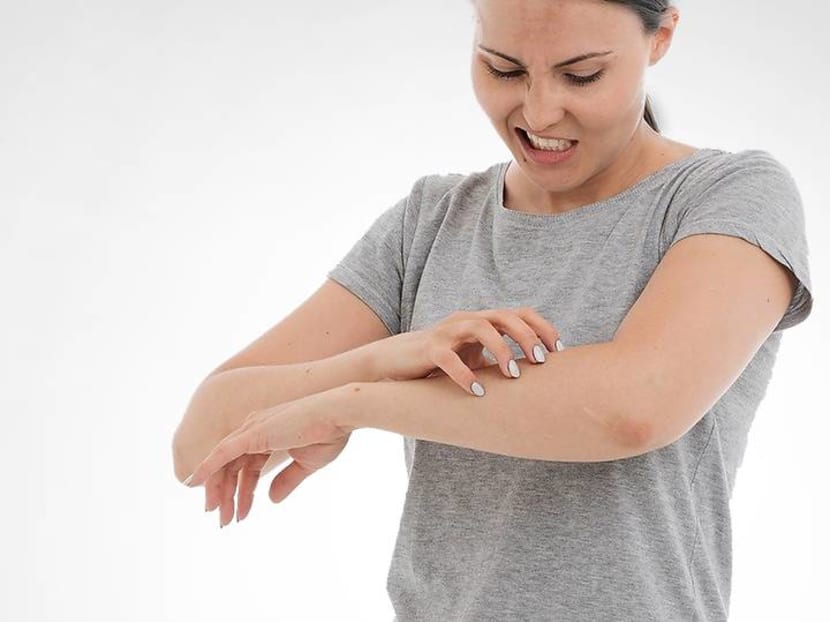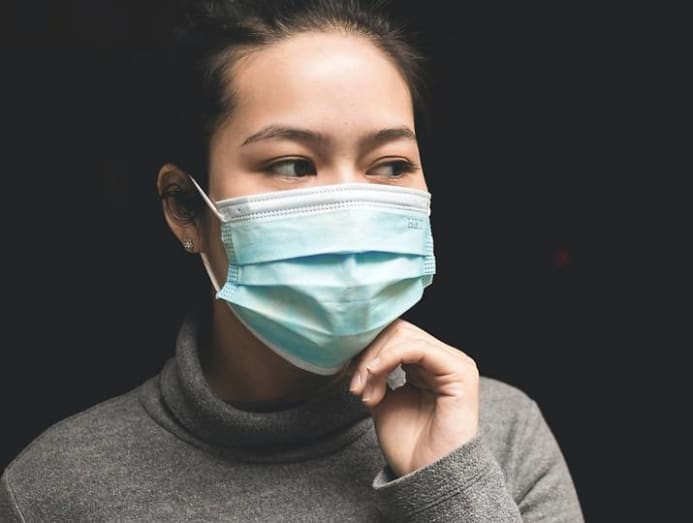How to deal with eczema if wearing masks and washing hands make you itch
There's been a rise in patients with eczema problems after the "circuit breaker". You might want to bring your own liquid soap and hand moisturiser, and speak to the doctor for help.

(Photo: Pixabay)
If you suffer from eczema, or what many doctors term as “atopic dermatitis”, you’d already steer clear of products that dry your skin as they exacerbate your condition.
But with the current pandemic comes the more frequent use of hand sanitisers and hand washing – and this doesn’t bode well for you.
Mask wearing, another adopted COVID-19 norm, isn’t a pretty development for skin either. “Overall, there is an increase in the number of consultations related to eczema from mask wearing,” said Dr Eileen Tan, who is a dermatologist at Mount Elizabeth Novena Hospital’s Eileen Tan Skin Clinic & Associates.
There has been a spike of 20 per cent to 30 per cent more patients presenting with flare-ups of their atopic dermatitis after the circuit breaker.
“Individuals with pre-existing skin problems such as eczema are more prone to flare-ups,” she said. “Users of tight-fitting face masks tend to run into more skin issues as heat, sweat and occlusion tend to aggravate itchy skin rashes and skin abrasions.”
Dr Tan isn’t alone in her observation. “There has been a spike of 20 per cent to 30 per cent more patients presenting with flare-ups of their atopic dermatitis after the circuit breaker,” said Dr Mark Tang, a medical director and consultant dermatologist at The Skin Specialists and Laser Clinic.
He added: “The pandemic has fundamentally changed the way we care for our skin. Frequent hand washing, and the use of antiseptic cleansers and hand sanitisers are crucial during these times.
However, these practices can further damage the fragile skin barrier in atopic dermatitis patients, leading to greater skin irritation and inflammation”.
Moisturise your face at least 30 minutes before wearing the mask with a light, non-greasy moisturiser.
Then, there’s the concern that the use of topical corticosteroids to control eczema may affect the immune system, rendering it less effective in keeping viruses at bay, including SARS-CoV-2, the one that causes COVID-19.
So what are you to do if you’re already battling eczema on a daily basis? Here’s a look:
HOW DO I DISINFECT MY HANDS WITHOUT WORSENING MY ECZEMA?
At home, use a gentle, soap-free cleanser, and minimise unnecessary hand washing, advised Dr Tang.
After washing, dry your hands gently. “Take special care between the fingers, where the skin is more prone to dryness and cracking,” he said. It is a good idea to use an emollient or moisturiser.
You should also apply regularly, paying attention to the fingers, nail bed and nail folds, he said.
READ: Is that face mask causing your sensitive skin to break out? A doctor's helpful tips
What if you need to disinfect your hands in public – should you use a hand sanitiser or wash your hands?
Hand sanitisers with at least 60 per cent alcohol may be effective against the coronavirus but they will sting eczema-affected skin.
“In my opinion, hand washing is generally better than using a hand sanitiser as one can apply skin moisturiser immediately after hand washing,” said Dr Tan.
To make hand washing even friendlier for your skin, Dr Tang recommended bringing your own liquid soap.
It is also a good idea to carry a tube of hand moisturiser with you and use it to offset the drying effects of hand washing, suggested Dr Tan.
“Ingredients in a good moisturiser, such as free fatty acids, ceramides and arginine, are essential to help restore damaged skin barrier in eczema-prone skin.”
WHAT ABOUT MASKS? HOW DO I WEAR ONE WITHOUT MY ECZEMA FLARING UP?
“Moisturise your face at least 30 minutes before wearing the mask with a light, non-greasy moisturiser,” said Dr Tang.
At the same time, continue with your treatment for eczema, he advised. “Early treatment makes a difference in minimising flare-ups and complications.”
You might also want to check the materials used for the mask in case they cause allergic reactions, said Dr Yu Jia De, a paediatric dermatologist at Massachusetts General Hospital. “Some masks include a glue strip along the nose and cheek area, which can trigger a reaction.”
READ: Thinning eyebrows: It could be a medical issue, not just a sign of ageing
He added on National Eczema Association’s website: “Some masks also contain a metal wire to allow you to mould it to your face. This wire may be made out of nickel, a common contact allergen.
I recommend attaching a soft fabric layer between the mask and your skin to prevent the nickel from touching your skin or finding a mask that does not have the metal wire”.
I HAVE OPEN CRACKS IN MY SKIN DUE TO ECZEMA – WILL THIS INCREASE THE RISK OF GETTING COVID-19?
At the moment, experts still don’t know for sure if COVID-19 can be transmitted via the skin, said Dr Peter Lio, an assistant professor of clinical dermatology and paediatrics dermatology at Northwestern University Feinberg School of Medicine and the founding director of the Chicago Integrative Eczema Center.
“However, because the coronavirus seems to be transmitted through contact transmission with the mouth, eye and airway mucosa – either directly or indirectly – it seems to be unlikely that damaged skin increases the risk.

“Of course, bacterial infections are much more likely in compromised skin as are certain viral infections such as herpes simplex virus, but with this (coronavirus) type of respiratory infection, my thinking is that there is not a significantly increased risk,” said Dr Lio, on National Eczema Association’s website.
I READ THAT CORTICOSTEROIDS CAN AFFECT THE IMMUNE SYSTEM’S ABILITY TO FEND OFF INFECTIONS. SHOULD I STOP USING THESE?
Corticosteroids work by decreasing inflammation and reducing the activity of the immune system, explained Dr Tan, so that may explain the concerns eczema patients have during the pandemic.
Furthermore, topical corticosteroids is the mainstay of prescription drugs used to treat eczema, she said.
READ: Is the makeup you're wearing to the gym causing acne, eczema and clogged pores?
Fortunately, the risk of topically applied corticosteroids causing an increased susceptibility to COVID-19 infection is "very low, especially when used judiciously”, said Dr Tang.
“It is more important to control the eczema as poorly controlled eczema may lead to more hand-to-face contact, due to the itch or scratching, which is a risk factor for catching viral infections.”
What about oral corticosteroids that are sometimes prescribed to control moderate to severe flare-ups of eczema? “In general, a short course such as one week to 10 days will not lead to significant immune suppression,” said Dr Tan.
However, she cautioned that if you have been on oral corticosteroids for a longer duration, you will be at a higher risk of contracting bacterial, fungal or viral infection.
“Patients should speak to their dermatologist to consider systemic non-steroid alternatives if they require oral corticosteroids to control eczema.”
WOULD THE EVENTUAL COVID-19 VACCINE REACT WITH THE CORTICOSTEROIDS I’M USING FOR ECZEMA?
According to Dr Tang, it depends on whether the COVID-19 vaccine is a live or inactivated vaccine. “A live vaccine may not be suitable for patients on immune-suppressing drugs, but an inactivated vaccine is likely to be safe and effective.”
A live vaccine is also to be avoided if you are treated with biologic drugs instead of corticosteroids for eczema.
Biologic drugs are produced from living organisms or contain components of living organisms, and according to Dr Tang, “have a ‘cleaner’ mode of action and hits where it matters most”.
“In contrast, corticosteroids are non-specific, and block the entire repertoire of the immune system and other immune cells.”
One such drug that has been approved for use by Singapore’s Health Sciences Authority last April to treat moderate to severe eczema is dupilumab.
“In laymen terms, dupilumab targets specific aspects of the immune system that are causing the inflammation,” said Dr Tan. “This, in turn, helps to reduce various symptoms in eczema.”
CAN PATIENTS GET DESENSITISED TO BIOLOGICS, LIKE SOME DO WITH CORTICOSTEROIDS?
“To date, the long-term three-year data has not shown any loss of effect or resistance for patients on continuous biologic therapy,” said Dr Tang, though there are side effects, mainly conjunctivitis and injection site pain. Yes, biologic drugs are given as injections.
Another drawback is the cost. A box of dupilumab, for instance, costs approximately S$2,500 and a minimum of four months of treatment is recommended, said Dr Tan.
Biologics are also not approved for children under age 12, pregnant or breastfeeding women, and those who have parasitic infections.





